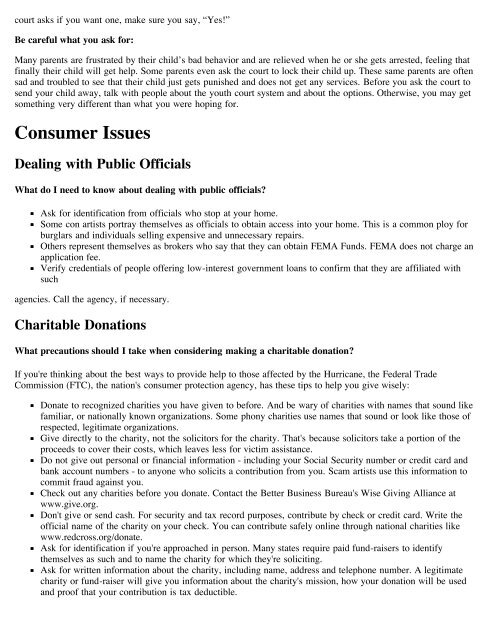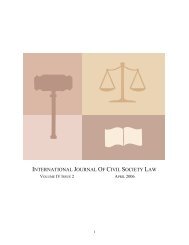Hurricane Katrina: Legal Issues - Columbus School of Law
Hurricane Katrina: Legal Issues - Columbus School of Law
Hurricane Katrina: Legal Issues - Columbus School of Law
You also want an ePaper? Increase the reach of your titles
YUMPU automatically turns print PDFs into web optimized ePapers that Google loves.
court asks if you want one, make sure you say, “Yes!”<br />
Be careful what you ask for:<br />
Many parents are frustrated by their child’s bad behavior and are relieved when he or she gets arrested, feeling that<br />
finally their child will get help. Some parents even ask the court to lock their child up. These same parents are <strong>of</strong>ten<br />
sad and troubled to see that their child just gets punished and does not get any services. Before you ask the court to<br />
send your child away, talk with people about the youth court system and about the options. Otherwise, you may get<br />
something very different than what you were hoping for.<br />
Consumer <strong>Issues</strong><br />
Dealing with Public Officials<br />
What do I need to know about dealing with public <strong>of</strong>ficials?<br />
Ask for identification from <strong>of</strong>ficials who stop at your home.<br />
Some con artists portray themselves as <strong>of</strong>ficials to obtain access into your home. This is a common ploy for<br />
burglars and individuals selling expensive and unnecessary repairs.<br />
Others represent themselves as brokers who say that they can obtain FEMA Funds. FEMA does not charge an<br />
application fee.<br />
Verify credentials <strong>of</strong> people <strong>of</strong>fering low-interest government loans to confirm that they are affiliated with<br />
such<br />
agencies. Call the agency, if necessary.<br />
Charitable Donations<br />
What precautions should I take when considering making a charitable donation?<br />
If you're thinking about the best ways to provide help to those affected by the <strong>Hurricane</strong>, the Federal Trade<br />
Commission (FTC), the nation's consumer protection agency, has these tips to help you give wisely:<br />
Donate to recognized charities you have given to before. And be wary <strong>of</strong> charities with names that sound like<br />
familiar, or nationally known organizations. Some phony charities use names that sound or look like those <strong>of</strong><br />
respected, legitimate organizations.<br />
Give directly to the charity, not the solicitors for the charity. That's because solicitors take a portion <strong>of</strong> the<br />
proceeds to cover their costs, which leaves less for victim assistance.<br />
Do not give out personal or financial information - including your Social Security number or credit card and<br />
bank account numbers - to anyone who solicits a contribution from you. Scam artists use this information to<br />
commit fraud against you.<br />
Check out any charities before you donate. Contact the Better Business Bureau's Wise Giving Alliance at<br />
www.give.org.<br />
Don't give or send cash. For security and tax record purposes, contribute by check or credit card. Write the<br />
<strong>of</strong>ficial name <strong>of</strong> the charity on your check. You can contribute safely online through national charities like<br />
www.redcross.org/donate.<br />
Ask for identification if you're approached in person. Many states require paid fund-raisers to identify<br />
themselves as such and to name the charity for which they're soliciting.<br />
Ask for written information about the charity, including name, address and telephone number. A legitimate<br />
charity or fund-raiser will give you information about the charity's mission, how your donation will be used<br />
and pro<strong>of</strong> that your contribution is tax deductible.

















